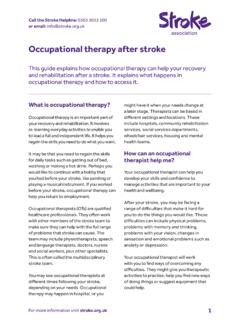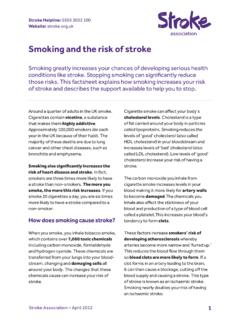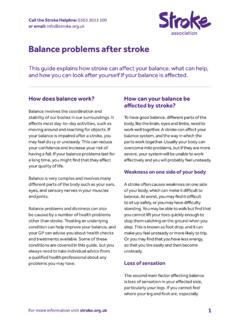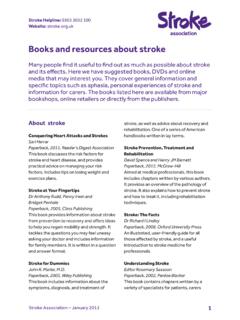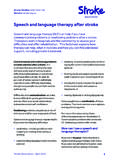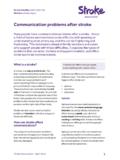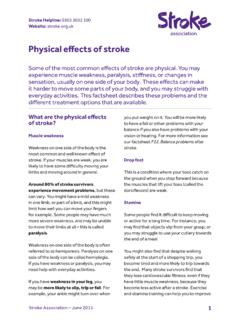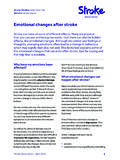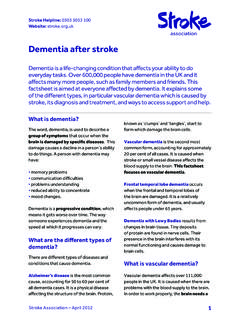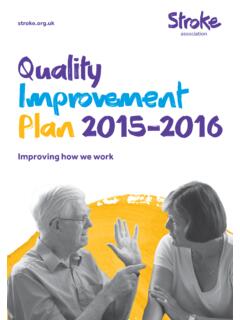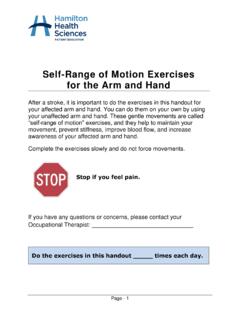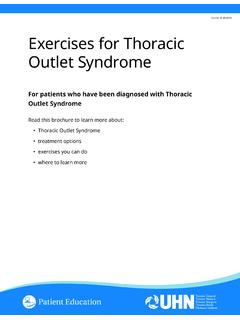Transcription of A complete guide to Communication problems after stroke
1 A complete guide to Communication problems after stroke problems with Communication are common after stroke . This guide will help you understand more about them. It explains why you may not be able to communicate properly after your stroke and how speech and language therapy can help. It also tells you what can do about Communication problems and has tips to help other people support you. It's aimed at people who have had a stroke but there is information for family and friends as well. We have information on all aspects of stroke . If you have a question that is not answered in this guide visit or call our stroke Helpline on 0303 3033 100.
2 2 Communication problems after stroke What's in this guide ? Why can't I communicate properly? 5. What kinds of problems can this cause? 5. Aphasia 5. problems with reading and writing 6. Dysarthria 6. Apraxia of speech 6. Will it get better? 7. Are there treatments that can help? 8. Speech and language therapy 8. Are there aids or equipment that can help? 12. Communication cards and passports 12. Charts and books 13. Electronic aids 14. Apps and computer programmes 14. What can I do about my speaking problems ? 15. Where can I get help and support? 16. How we can help 16. Other organisations that can help 16.
3 Tips for family and friends 18. A guide to good conversations 19. Communication problems after stroke 3. Why can't I communicate properly? Communication problems happen because Communication isn't just about speaking, a stroke damages your brain. however. Many people also have problems with reading and writing. When we communicate our brain has to complete a series of tasks. So when you're talking to someone and they ask you a Communication problems do not affect question, for example, your brain has to your intelligence understand what you are being asked, decide If you have Communication problems you on your answer and put the words together, simply have problems with the process of before you can give them a reply.
4 Speaking and sometimes understanding language. It has nothing to do with Different parts of your brain are responsible intelligence at all. for each of these tasks. Depending on the area of your brain that is damaged, you could have problems with any part of this process. 2. Remember it 1. 3. Hear it Understand it 7. Say the 4. words Find the words 6. Tell your muscles 5. how to Put a move sentence together What happens when we're asked a question 4 Communication problems after stroke What kinds of problems can this cause? Aphasia Signs of aphasia Aphasia affects your ability to speak and While it will be different for everyone, understand what others say.
5 It can also these are some of the more common affect your ability to read and write. Aphasia signs of aphasia: is sometimes called dysphasia. not being able to understand much of It happens when you're no longer able to what other people say understand or use language. It does not not being able to form words, only affect your intelligence, although some sounds people may treat you as if it has. Aphasia is a only being able to say single words or common problem after stroke and around a very short sentences, like want drink . third of stroke survivors have it. speaking slowly, with very long pauses missing out words or getting them in There are different types of aphasia: the wrong order getting stuck on a single word or Broca's aphasia or expressive aphasia, sound, and repeating it over and over is when you find it very difficult to speak.
6 Saying one word when you mean You may only be able to say single words or another, so you may say milk instead very short sentences, although it's usually of water , or yes instead of no . possible for other people to understand not being able to find the right word, what you mean. even though you can describe what you're thinking of Wernicke's aphasia or fluent aphasia, is talking nonsense, but not realising that when you're able to speak well and use you're not making any sense long sentences, but what you say does not being able to read headlines in a make sense. You may not know that what newspaper, but not the rest of the text you're saying is wrong, so you may get being able to write, but not read what frustrated when people don't understand you've written.
7 You. Global aphasia is when you have serious Communication problems and you may not be able to speak, read or write at all. Losing your Communication doesn't just affect you, it affects everyone around you too.. Chris Communication problems after stroke 5. problems with reading and Apraxia of speech writing Apraxia is when you have problems moving your muscles in the right order. This makes Alexia is when you find reading difficult, is hard to move your body in the way you because you're not able to recognise written want to. Some people call this dyspraxia. words. It is sometimes called word blindness or visual aphasia.
8 Apraxia of speech is when you can't move the muscles in your face, mouth or throat in If you have problems with writing this is the order you need to when you're speaking. known as agraphia. You may find it difficult This can make it difficult for other people to spell words, write sentences in the right to understand you. You may not have any order or draw a letter, or you may not be able weakness in these muscles and you may be to write at all. able to control them individually without any problem . However, you can't move them in the way you want to when you try to speak. Dysarthria This is because apraxia is a problem with To speak clearly, we need to control the planning movements, rather than the muscles in our face, mouth and throat as movements themselves.
9 So even though you well as our breathing. Dysarthria happens may not be able to say goodbye if someone when you're not able to do this. asks you to, you may be able to say it when you go to leave, because you're doing it Dysarthria doesn't affect your ability to without thinking. understand other people or to find words and put them together, unless you have other Signs of apraxia of speech Communication problems at the same time. Dysarthria is a common problem after stroke . It can be hard sometimes to tell the Out of everyone who has a stroke , nearly half difference between apraxia of speech and experience it in some way.
10 Other Communication problems . Signs of dysarthria These are some common signs: not being able to say words clearly, Dysarthria affects people in different especially when someone asks you to ways. For some, their speech may only your speech changes and words sound be a little unclear and people will usually different every time you say them be able to understand them. However, you try to correct yourself, because you for others it means that they can't speak know things sound wrong clearly at all. you hesitate between words or need several attempts before you can say a Some common signs include: word not being able to speak clearly you are able to say things clearly when slurred or slow speech you recite them in a list (like days of the speaking with a quiet or strained voice, week or numbers), but not when you're or one that doesn't change its tone asked to say them on their own hesitating a lot or speaking in short not being able to speak at all bursts, rather than full sentences.
